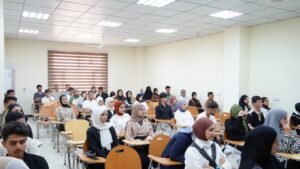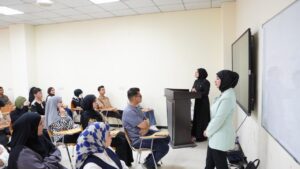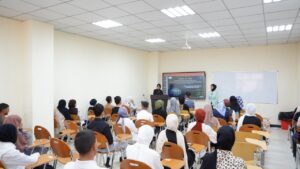Kirkuk Technical Medical Institute Organizes a Workshop Titled “The Arabic Language in the Age of Artificial Intelligence”
Under the patronage of the President of the Northern Technical University, Professor Dr. Alia Abbas Ali Al-Attar, and under the supervision of Assistant Professor Dr. Lizan Medhat Muhammad, Dean of the Technical Medical Institute,
the Rehabilitation, Employment, and Follow-up Unit, in cooperation with the Department of Community Health Technologies, organized a workshop titled “The Arabic Language in the Age of Artificial Intelligence”
Lecturers:
1. Asst. Ms. Laila Abbas Omar
2. Ms. Nibras Jassim Hammadi (Assistant, Rehabilitation, Employment, and Follow-up Unit)
*:- The workshop included
—
Objectives:
Exploring the impact of artificial intelligence on the Arabic language.
Identifying smart tools and applications that support the Arabic language.
Discussing the challenges of preserving linguistic identity in light of technological development.
Enhancing participants’ awareness of the importance of developing Arabic digital content.
—
Main Topics:
1. Introduction to Artificial Intelligence:
Defining artificial intelligence and its areas of use.
Real-world examples (e.g., machine translation, smart assistants, ChatGPT).
2. Arabic Language and Artificial Intelligence:
Linguistic challenges specific to Arabic (morphology, context, dialects).
AI models that support Arabic (e.g., Arabic BERT, AraBERT, GPT models).
3. Practical applications:
Linguistic proofreading tools.
Text-to-speech (TTS) and vice versa.
Arabic content generation (e.g., writing articles, summaries, translations).
4. Challenges and opportunities:
Scarcity of Arabic digital data.
The importance of community contribution to enriching Arabic content.
Opportunities for developing new tools in Arabic.
—
Workshop activities:
Group discussion: What challenges does Arabic face in the digital world?
Tool testing: Using AI applications in Arabic (e.g., ChatGPT, Google Translate, or voice tools).
Brainstorming: Developing smart application ideas that serve the Arabic language.
Small project: Writing Arabic text with the help of AI and manually reviewing it.
—
Target Audience:
University students, teachers, content creators, and those interested in technology and language.
—
Expected Outcomes:
A deeper understanding of the relationship between Arabic and modern technologies.
The ability to use artificial intelligence tools to support the Arabic language.
Raising awareness of the importance of developing smart Arabic content.



